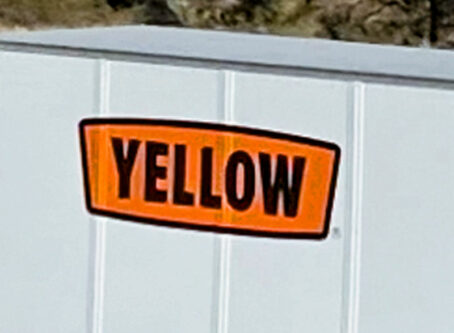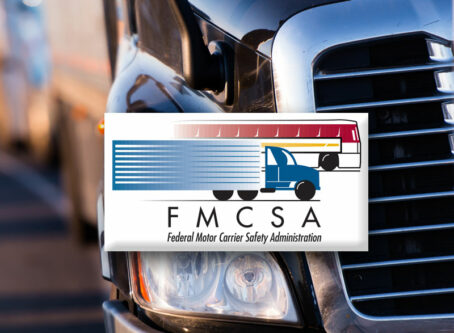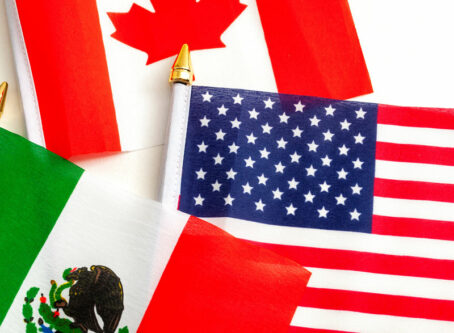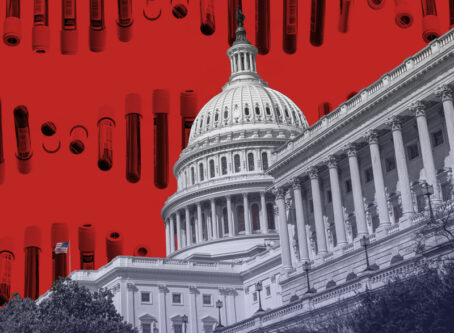As cross-border vaccine mandates begin, concerns over supply chain grow
Canada’s COVID-19 vaccine mandate for cross-border truckers went into effect over the weekend. Now, the United States plans to implement a similar mandate beginning Saturday, Jan. 22.
Each country’s rule prevents unvaccinated or partially vaccinated foreign national truckers from crossing the border. Both rules have been criticized because they could create more supply chain disruptions.
Bloomberg reported this week that Canada’s rule already has led to a surge in produce prices. George Pitsikoulis, president of Montreal-based distributor Canadawide Fruits, told Bloomberg that the cost of transporting produce out of California and Arizona to Canada jumped 25%. In addition, a recent Wall Street Journal article stated that two-way trade in merchandise goods between the United States and Canada totaled more than $600 billion in 2019. It is estimated that about 80% of those goods moved on trucks.
The rules could lead to a significant reduction in truckers willing to cross each country’s border. The American Trucking Associations estimates that about half of truck drivers have not received the COVID-19 vaccine. According to an OOIDA Foundation survey from April 2021, about 75% of OOIDA’s members who responded said they didn’t plan to receive the vaccine.
Canada’s rule requires American truck drivers to be fully vaccinated before crossing into Canada. It also includes requirements for Canadian truckers.
In order to be considered a fully vaccinated traveler into Canada, a person must have received at least two doses of accepted vaccines or one dose of the Janssen/Johnson & Johnson vaccine at least 14 days before entry.
Canada’s list of approved vaccines:
- AstraZeneca/COVISHIELD
- Bharat Biotech
- Janssen/Johnson & Johnson
- Moderna
- Pfizer-BioNTech
- Sinopharm BIBP
- Sinovac
Canada accepts any valid proof of vaccination, including those issued by Canadian provinces and territories, as well as international proof of vaccination documents.
Although more information on the U.S. rule is expected ahead of the Jan. 22 implementation date, the U.S. Department of Homeland Security released some guidance in November.
According to the guidance, all FDA-approved and authorized vaccines will be accepted, as well as all vaccines that have an emergency use listing from the World Health Organization.
Individuals are considered fully vaccinated:
- Two weeks after your dose of an accepted single-dose COVID-19 vaccine.
- Two weeks after your second dose of an accepted two-dose series.
- Two weeks after you received the full series of an accepted COVID-19 vaccine (not placebo) in a clinical trial.
- Two weeks after you received the full series of a Novavax COVID-19 vaccine (not placebo) in a phase 3 clinical trial.
- Two weeks after you received two doses of any “mix and match” combination of accepted COVID-19 vaccines administered at least 17 days apart.
More information regarding CDC guidance can be found here.
In December, 14 U.S. senators wrote a letter to President Joe Biden asking for the United States and Canada to establish a reciprocal policy for cross-border truckers that does not include a vaccine mandate.
“Despite the good intentions underpinning this action, we fear that the imposition of vaccine mandates as a requirement to cross the land border will exacerbate the existing challenges facing our freight networks and supply chain and could further fuel inflation and rising prices on top of what Americans are already seeing,” the senators wrote. “Our nation’s truck drivers worked diligently during the pandemic to facilitate critical cross-border freight movements that helped to feed and clothe American communities. Now, implementing these policies could cost them their jobs.”
The Owner-Operator Independent Drivers Association has said that all truck drivers should be exempt from vaccine mandates. LL









